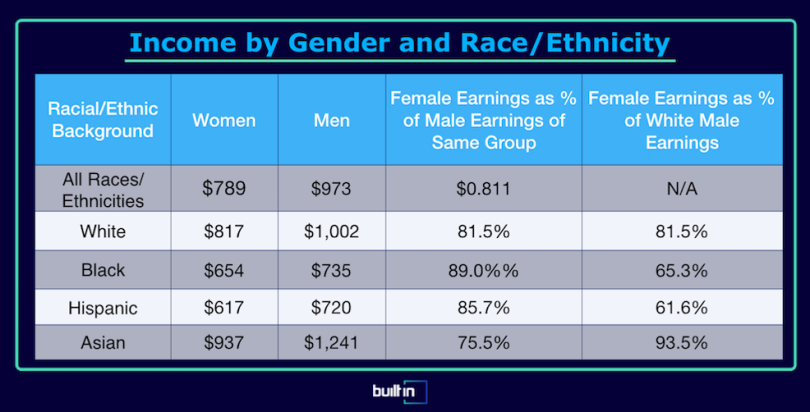Salary negotiations are challenging for both candidates and employers. Why? Well, when you think about it, a person’s salary reflects their monetary value as a contributor to your company. And while everyone should feel like a million bucks, the vast majority of candidates are not actually worth a million bucks.
In order to find a middle-ground for how much a candidate believes they are worth and how much you, as an employer, value this person’s contribution to your company, you’ll need to master the art of negotiating.
This article will walk you through the negotiation process from the moment you open a role until your final communications with a candidate after they either accept or decline an offer. Feel free to click on the links below to skip ahead or read on.
We analyzed more than half a million applications to uncover what the candidate journey in the tech industry looks like.
Table of Contents
- Research Fair Market Salaries
- Check Salary Tools
- Consider Perks & Benefits
- Actively Negate Wage Gaps
- Prepare & Remain Transparent
- Make the Offer
- End on a Positive Note
Research Fair Market Salaries

Before you even post a job description, conduct extensive research on expected salaries for your specific role along with a number of factors that will affect how much this role is worth to your company. Here are some key factors to consider:
Industry average. Every industry has different standard salaries for every role out there. If you’re in the nonprofit industry, you’re likely unable to pay your team members the same as a company in healthcare or tech.
Company size. Smaller companies typically have smaller budgets and resources, so compare your salaries to other companies that resemble the current state and size of your company.
Economic conditions. It’s no secret that the economy has a major impact on companies, employment and salaries. Salaries are likely to be lower and jobs more competitive in a recession when unemployment rates are high. However, when unemployment rates are at all-time-lows, it becomes a candidate-driven market, and you may need to bump up compensation offers to obtain top talent.
Location. Salaries for companies located in big metropolitan cities where employees are expected to incur elevated costs of living are likely higher than for companies in small-town America.
Cost of living. Each year, the cost of living increases around 2-6% on average, and candidates expect an increase in salary by at least that percent each year. Know that this number will vary based on where you live and economic situations.
Commission. Consider if the role you are hiring for has a set salary or if it has a base pay with commission. Most sales candidates expect commission to be considered in their pay, so figure out what the range and average of commission will be for new employees so they know what to expect.
Skills. Define a set of skills needed for a candidate to be successful in the role when writing job descriptions. When doing so, consider how much each skill is really worth. You’re likely not going to find a candidate with every single skill, so estimate what skills will increase a candidate’s starting salary. There also may be a skills shortage or surplus in your industry or geographical location that will contribute to this factor.
If a candidate lacks certain skills, utilize that as a talking point for future pay raises later in their career. You can also leverage this information in your negotiations and offer learning opportunities for candidates to bridge their skills gap in lieu of higher salary.
Managerial responsibilities. Consider whether this person will be an individual contributor or in a managerial role. Managing employees comes with much higher responsibilities and challenges and therefore deserves a higher salary compared to people of the same level and experience who are individual contributors.
Experience. Know that people with more experience will expect higher salaries. On your job description, you may set a range of experience for a role. Factor in how much experience contributes to a candidate receiving the top end of your salary range versus the bottom end.
Seniority. It's no surprise that a person who is early in their career or recently switched career paths will have a different salary from people later in their careers or at higher seniority levels. Consider this when setting and negotiating salaries.
Company average. In addition to industry and competitor salary rates, look at your internal salaries to determine what is common for people in certain roles and seniority levels to receive at your unique company.
Once you gather all of this information, you’ll be able to determine the fair market value for your role and move on to the next step of the negotiation process.
Check Salary Tools

When conducting research, utilize online salary tools. These tools aggregate information provided by current and past employees who share information about their roles, including compensation information. These tools calculate average salaries by job title, location, company and a number of other factors.
Know that these tools are just that — tools. They are by no means perfect or entirely accurate. For example, if an employee decides to put their salary as a million dollars, it will significantly skew the results for average and median salaries on the salary tool. Before you take these tools as truth, look into how they calculate their results to see if they account for outliers. It’s also a good idea to cross-check salaries across several tools to get a wider range of data.
You can also check out hyper-local salaries with the salary tools from each of our markets if you’re located in Austin, Boston, Chicago, Colorado, Los Angeles, New York City, San Francisco or Seattle. While no salary tool is perfect, these salary tools do account for outliers to provide you with the most accurate information available. Once you've determined the right salary for the job, you can move on to analyzing the full compensation package.
Consider Perks & Benefits

When you’re discussing compensation with a candidate, make sure to consider the entire package, which includes perks and benefits. It’s not only important to create an exhaustive list of everything you have to offer, it’s important to know the value of each and every perk and benefit. Why? Because perks and benefits are additive bonuses that can make or break a negotiation. Not only that, but certain perks and benefits will motivate candidates more so than higher pay.
In any case, if you know the monetary value of each perk and benefit, you'll be able to provide candidates with information on the full compensation package you have to offer along with its total value.
Perks and benefits that contribute to the monetary worth of your offer include:
-
Pay bonuses: performance bonuses, severance package, commission, relocation assistance
-
Insurance: medical, dental, disability, FSA, life, pet, vision
-
Retirement benefits: 401(K) & 401(K) matching
-
Time off: paid holidays, paid sick days, sabbatical leave, unlimited vacation
-
Stock: employee stock ownership plan, stock options, vesting options
-
Paid food and beverages: beer on tap, daily meals provided, happy hours, stocked kitchen
-
Parental benefits: adoption assistance, child care, generous parental leave
-
Family benefits: family medical leave
-
Education: conferences, training, continuing education stipend, online course subscriptions, paid industry certifications, tuition reimbursement
-
Wellness: onsite gym, gym membership
-
Allowance: parking, computer, phone, car
You should also consider other non-monetary perks and benefits like mentoring, promoting from within and learning opportunities within the role. While there may not be a dollar sign attached to these benefits, they will be important to top candidates and could help sway their decision.
Actively Avoid Wage Gaps

Unfortunately, wage gaps remain a prevalent issue for underrepresented groups and women. Unconscious biases related to age, gender, gender identity and expression, sexual orientation, race, ethnicity and privilege play a major role in pay discrepancies. Don’t believe us? Just check out these 2018 statistics on discrepancies in pay based on gender, race and ethnicity in the U.S.

Not only is it unethical to pay individuals unequally because of unconscious biases an employer may have against certain demographics, it’s also illegal. Before you start setting pay and negotiating, make sure you brush up on laws related to employee salary and pay. For reference, the 2019 Paycheck Fairness Act (PFA), which was first devised in 1997, builds upon existing legislation with three key components:
-
It prohibits employers from asking candidates how much they previously made.
-
It allows employees to share their pay with work colleagues.
-
It requires employers to disclose all pay information with the Equal Employment Opportunity Commission.
The Equal Pay Act of 1963 prohibits gender-based pay discrimination, and the Lilly Ledbetter Fair Pay Act of 2009 prohibits gender-based wage discrimination as well as permits employees to sue their employers for discrimination.
Let’s be clear - these wage gaps don’t just come from employers setting different salaries for people of varying demographics. Negotiations are a major contributor to wage gaps as well.
While 73% of employers expect to negotiate salary with candidates, only 56% of candidates report that they actually negotiate with employers. Not only that, but female candidates are found to negotiate 16% less often than male candidates, and even when they do, they ask for an average of $7,000 less than men during negotiations.
The top reasons candidates do not negotiate salary include:
-
Being uncomfortable asking for a higher salary
-
Being concerned the employer will rescind their offer
-
Being afraid of appearing greedy
Another study found that white employees have higher peak pay expectations than black and African American employees across jobs, which affects candidates when it comes time to negotiate starting salary. Not only that but racial biases lead to black and African American job seekers receiving lower starting salaries post-negotiating.
As an employer, you have a significant influence on wage gaps within your company, especially when it comes time to negotiate with candidates. Make sure you’re paying employees equally and fairly, and do some research on how you can actively help reduce such wage gaps at your company. And when conducting research, consider all types of diversity in the workplace and the wage gaps that affect people of different demographics — not just gender.
Remain transparent

If you were planning on asking candidates about their current or past pay, know that it’s actually not legal in a number of cities and states. However, if you have conducted thorough research and you are confident in the amount you’re offering for the role, it shouldn’t matter what the candidate made in their previous position.
Not only that, but you can and should be transparent about what you’re willing and able to pay for this role up front in the recruiting process. At the time you post your job description, you should know the exact rage you’re going to pay for this role, so keep matters simple and post that range on your job description.
Remaining transparent from the get-go will save you time recruiting candidates who wouldn’t accept your compensation offer in the end. On the flip side, you'll also be able to tell pretty quickly whether a candidate is just in it for the money if their skills and experiences don’t match the job description.
When you do get down to the final stages of the recruiting process, be transparent about the salary range or salary band. If you have a stellar candidate and the range is negotiable, let them know that. Otherwise, inform them that their salary will be determined within that range based on their skills and experiences.
Once you make the job offer, set a deadline for when you will have a conversation with the candidate about compensation details. Give them enough time to consider the offer, but enough urgency to make a decision before they have time to consider another employer. When the deadline is reached, set up a phone call with the candidate. Give them enough advance notice so they have time to prepare a counter-offer or explanation of the salary they believe they are worth. If the candidate takes longer than the established deadline, you may want to reach out to other qualified candidates.
By now you’ve conducted extensive research on fair market value salaries. You’ve checked salary tools, considered your perks and benefits and you’ve even gone above and beyond to understand pay disparities and biases that affect people of different demographics. At this point you (should have) already shared your set salary range with your candidate and provided them with a deadline for the salary negotiation conversation — today’s that day.
Make the offer

We recommend having this conversation over the phone rather than in-person or via email. Doing so will reduce the risk of miscommunication via written conversation and mitigate obvious tension from an in-person discussion.
If you’re a bit nervous, know that the candidate probably is, too. And while it’s important to come to this conversation prepared and confident, make sure you also come with calm and empathetic energy as well.
When you get on the phone, don’t beat around the bush. State the specific salary your team has set early on in the conversation and provide them with information on how your team came to that specific number. Explain how your team believes that amount reflects their current skill set, experience, etc.
While some people may suggest that you set your offer a little lower than you’re willing to pay so you have something to leverage against a higher counter offer, doing so may contribute to wage gaps. As we mentioned earlier, people of different demographics have drastically different tactics for negotiating and determining a starting salary, so bridge those pay gaps by paying every individual exactly what they're worth to your company.
In addition to salary, walk candidates through all of the perks and benefits your company has to offer. If possible, include the monetary value of each benefit so candidates have an idea of how much the total offer is really worth.
Once you’ve covered the full compensation package, provide the candidate with the opportunity to share their feedback and opinions. You’ll be able to tell right away whether a candidate is thrilled and ready to sign an agreement or if they’re hesitant and disappointed in the offer you’ve posed. Kindly encourage them to walk you through what their expectations are and how your offer falls short. Once they’ve either agreed to the offer or shared their discontent, you have two options:
Option 1. If you’re unsure on whether or not you can meet their demands, ask them exactly what they need to accept the offer. You may request they send an email with the exact standards they expect for this role so they have time to critically think about their counter-offer and so you have it in writing. Then, ask to schedule a follow-up phone call within 24 hours so you can deliberate with your team about where you can adjust the salary, add perks and benefits or alter the job description. Then, call the candidate back at the scheduled time to provide your counter-offer.
Option 2. If you already know where your team can budge on the compensation package, you can provide your counter-offer now or inform them that your offer is not flexible and that it’s truly the best your company is able to offer them.
When it comes down to it, neither you nor the candidate want to settle for anything less than they think this offer is worth. However, you also don’t want to give in and pay the candidate more than your company can afford or more than you pay other employees of similar stature. Doing so will also negatively affect wage gaps.
Once you’ve posed a counter-offer, the candidate will either accept or decline the offer. Above anything else, regardless of how conversation ends, be sure to...
End on a Positive Note

No matter how negotiations go, whether the candidate accepts or declines your offer, it is critical that you end the conversation on a positive note.
First of all, take a moment to place yourself in the candidate’s shoes. They have been searching for a job for weeks if not months. They apply for a role they are excited about and make it all the way through the interview and recruiting process. Then in the final decision-making stage, it doesn’t work out, and they now have to start the process all over again. While they may have other offers standing, it’s still important to recognize the time and effort candidates put into pursuing your open role.
If the candidate does accept the offer, send them an official job offer letter either via mail or digitally, and ask them to sign and date the forms to make it official. In the letter, share your enthusiasm for their acceptance of the offer and reiterate their official start date. If they aren’t starting for a few weeks, consider sending them a swag package in the interim to get them excited, or invite them to team outings so they have a chance to meet your team in a casual setting before they start. Doing so may also help eliminate some of those first-day jitters.
And if they decline your offer, you should still send them a ‘thank you’ letter to show your appreciation for their time and consideration of your role. By this point, they have undoubtedly spent several hours over the course of several weeks and months researching your company, applying for the role and going through the entire recruitment process.
After putting so much time into this opportunity, they are probably disappointed that it did not work out. Plus, this opens up a great opportunity to invite them to join your talent community. If the candidate made it this far in the recruitment process, they are clearly a solid match for your team. And even though this opportunity did not work out — for whatever reason — they may be an even better match for a role that will open up in the future. By joining your talent community, they will be one of the first people to know about your open roles, and if the overall recruitment process was positive, odds are they’ll apply again — saving your team time and money connecting with a candidate you’ve already thoroughly vetted.
As you can tell, negotiating salaries can be stressful and complicated. Once you've done it a time or two, you'll know exactly where to research salaries and you'll already know the value of your perks and benefits package. While each conversation will undoubtedly be different, you'll get in a flow and be a master of negotiating salaries in no time. If you're looking for more tech recruiter resources, check out some of our other related articles.
Use this guide to implement effective nurturing campaigns that keep candidates interested in your open roles.




